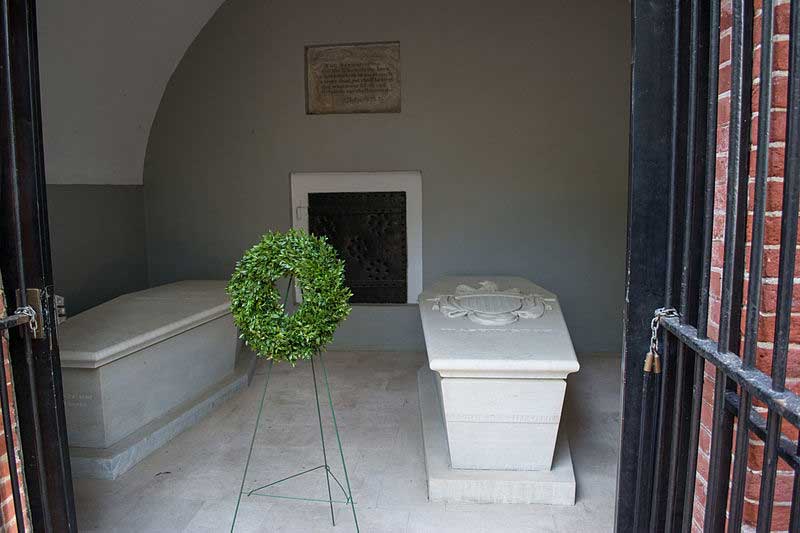
Born on 22 February 1732, at his family’s plantation on Pope’s Creek in Westmoreland County, George Washington was the eldest son of Augustine Washington and his second wife, Mary Ball Washington. His great-grandfather emigrated from England to Bridges Creek in the British colony of Virginia in late 1656 and accumulated 5,000 acres of land, while his father was a Justice of the Peace and a prominent public figure. George spent much of his childhood at Ferry Farm, a plantation near Fredericksburg, Virginia and inherited Ferry Farm and ten slaves, when he lost his father at the age of 11.His older half-brother Lawrence inherited Little Hunting Creek and renamed it Mount Vernon.
Unlike Lawrence, who was educated at Appleby Grammar School in England, George spent only about three years at a school in Fredericksburg, but learned mathematics, trigonometry, surveying, draftsmanship and map-making. In those early years he often visited Mount Vernon and the plantation of his brother's father-in-law, William Fairfax, at Belvoir. Fairfax somehow liked him and with the passing of time he became George's patron and surrogate father. At his instance, George received a surveyor's license from the College of William & Mary and with his patronage got an appointment as a surveyor of Culpeper County. He conducted surveys of the Shenandoah Valley, primarily for William Fairfax and became familiar with the frontier region.
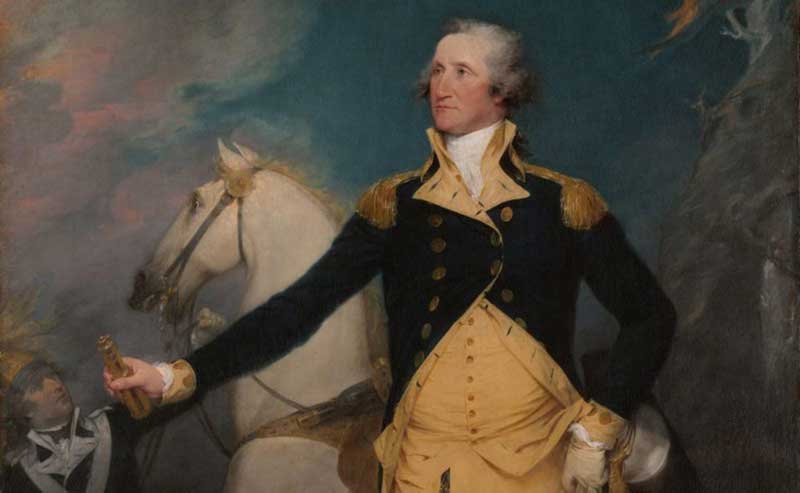
George Washington made his first and the last tour abroad in 1751, when he accompanied his older brother Lawrence to Barbados, with the hope that the warm weather of the country will help Lawrence to recuperate from tuberculosis. However, during the trip he contracted smallpox, which left some permanent scars on his face. Lawrence died in 1752 and eventually George leased Mount Vernon from Lawrence's widow and inherited it after her death in 1761.
As Robert Dinwiddie, the Lieutenant Governor of Virginia was very much pleased to see the early signs of natural leadership in Washington, he appointed Washington adjutant with a rank of major in the Virginia militia and on 31 October1753 sent him to Fort LeBoeuf in Pennsylvania, to warn the French to withdraw from the land claimed by Britain.
However, since the French refused to oblige, Washington immediately returned, but was sent back with troops. On May 28, he attacked a French post at Fort Duquesne and in that brief Battle of Jumonville Glen the French Commander Joseph Coulon de Jumonville was killed and most of his men were taken prisoner or killed. But, the French soon counterattacked and drove Washington and his men back to his post at Great Meadows. In the consequent Battle of Necessity in July, Washington had to surrender, but was soon released and returned to Williamsburg, Virginia’s colonial capital. As Washington apparently admitted that Jumonville was assassinated while engaged on a diplomatic mission, Colonel James Innes was given the command of the inter-colonial forces, while the Virginia Regiment was divided into independent companies, each to be commanded by a captain. Washington felt insulted at the decision, refused to accept demotion and resigned his commission.
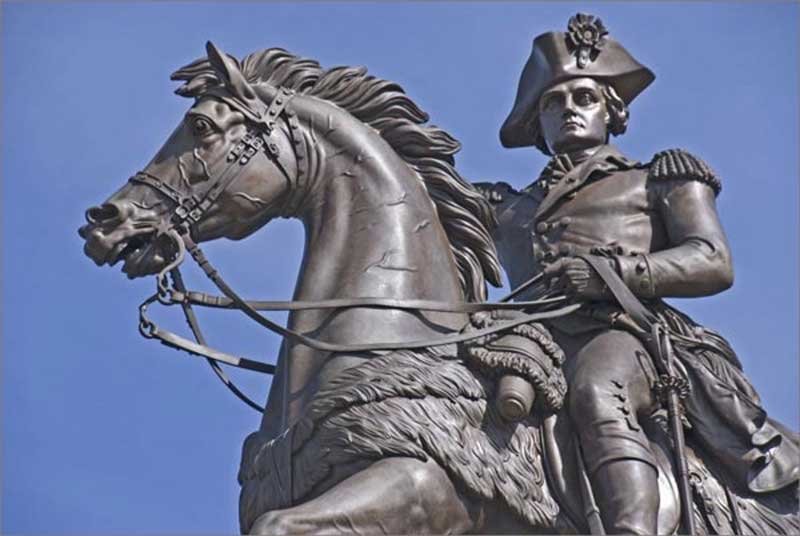
In 1755, Washington was given the honorary rank of colonel and joined the army of British General Edward Braddock to take the Fort Duquesne and expel the French from the Ohio Country. However, in the Battle of Monongahela the French and their Indian allies completely ambushed the army of Braddock. The British suffered a two-thirds casualties, Braddock was mortally wounded and Washington could do very little to turn back the rout and led the broken army back to safety. He escaped with four bullet holes in his hat and cloak, along with two horses shot out from under him.
At the age of 23, Washington was appointed by Dinwiddie as the commander of the Virginia Regiment in August 1755 and was sent to the frontier to patrol and protect nearly 400 miles of border. Unfortunately, he had with him a Virginia colonial legislature, who was unwilling to support him. It was a frustrating assignment, as he had to face twenty Indian attacks in ten months. Despite everything, in his efforts to bring the regiment up to a professional standard, Virginia's frontier population suffered less than any other colonies in those days. But, his health failed in the closing months of 1757and was sent home with dysentery.
As he returned to duty in 1758, the Virginia Regiment was instructed to join an expedition commanded by General John Forbes to capture Fort Duquesne. Forbes made Washington an honourary brigadier general in November and gave him command of one of the three brigades that would assault the fort. The fort was captured only after a friendly fire incident, which left 14 dead and 26 injured and the British gained control of the Ohio Valley. However, Washington was frustrated as his ambition for a royal commission was not fulfilled despite repeated requests and though the war was to continue for another four years, he resigned his commission in December 1758 and returned to Mount Vernon.
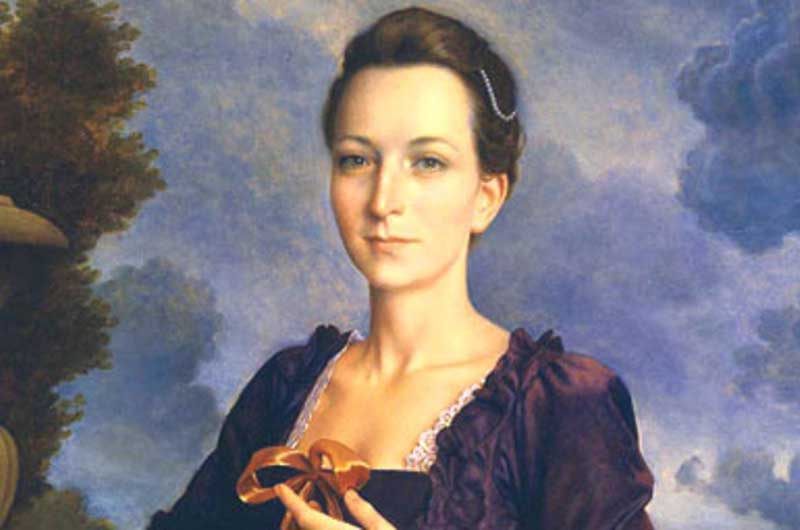
At the age of 26, a month after leaving the army, Washington married Martha Dandridge Custis, the 28-year-old wealthy widow of Daniel Parke Custis. Martha, an intelligent and gracious lady, was experienced in managing a planter's estate. She brought with her a considerable fortune of an 18,000-acre estate. With this added estate, along with the land he was granted for his military service, Washington became one of the wealthiest landowners in Virginia. He also acquired 84 slaves through the marriage. In Mount Vernon, near Alexandria, the couple started their new life as a planter of tobacco and wheat and gradually emerged as a political figure
It is said that the bout of smallpox in his early age rendered him sterile and the couple lamented that they had no children together. However, George lovingly raised John (Jacky) and Martha (Patsy), Martha’s children from her previous marriage and later their grandchildren Eleanor Parke Custis and George Washington Parke Custis. George was heartbroken when Patsy died just before the Revolution in his arms and Jacky died during the Revolution.
As a large landowner and a respected military hero, George Washington held local office and was elected to the Virginia provincial legislature, representing Frederick County in the House of Burgesses for seven years from 1758. He opposed the imposition of the Stamp Act of 1765 and became more politically active in 1769, when he introduced a resolution to the House of Burgesses calling for Virginia to debar British goods until the repressive Acts were repealed. Along with the other colonists, he was further infuriated by a Royal Proclamation in 1763, banning American settlement west of the Allegheny Mountains and protecting the British fur trade. Washington chaired a meeting in 1774, in which the Fairfax Resolves were adopted calling for the convening of the Continental Congress and the use of armed resistance as a last resort. In March 1775, he was selected as a delegate to the First Continental Congress. The Continental Army was created by the Congress in June and Washington was nominated commander in chief for his military experience. He was unanimously elected commander in chief by Congress on the next day and on 16 June he appeared before Congress in uniform and gave an acceptance speech.
The battles of Lexington and Concord on 19 April 1775 signaled the beginning of the Revolutionary War, when the British had to retreat back to Boston. In March 1776, George Washington tasted victory, when he placed artillery above Boston, on Dorchester Heights and compelled the British to withdraw. He then moved his troops to New York City. However, in August 1776, the British army under the command of Sir William Howe, attacked and quickly took New York City. Washington's army was completely routed and suffered the surrender of 2,800 men.

Washington's army, reduced to 5,400 troops, retreated through New Jersey, while General Howe delayed his advance on Philadelphia and wintered his troops at Trenton and Princeton. Washington wanted to take this opportunity. He met with his generals on Christmas Eve and decided to launch a surprise attack from three sides on the Hessian garrison at Trenton. Despite the ice-obstructed river in sleet and snow, Washington and his men crossed the Delaware River stealthily on Christmas night, 1776. Veiled by sleet and snowfall, they proceeded toward Trenton and at sunrise, they made a coordinated surprise attack on the Hessians, with Washington leading the charge, aided by Major General Henry Knox and artillery. In the ensuing battle, 22 Hessians were killed, 83 were wounded and 850 were captured. Washington returned to New Jersey on January 3 and launched an attack on the British regulars at Princeton, dealing them a humiliating loss.

However, Sir William Howe believed that, once the Americans were deprived of their major cities, the rebellion would wither. Therefore, he mounted an offensive against Philadelphia in the summer of 1777 and though George Washington moved with his army to defend the city, he was defeated at the Battle of Brandywine and Philadelphia fell two weeks later. In the late summer of the same year, the British army under the command of John Burgoyne proceeded southward from Quebec to Saratoga, New York, with the intention to split off the rebellion in New England. Somehow, Burgoyne expected to meet a similar British force marching eastward from Lake Ontario and another British force marching northward from New York City. But it never happened and Burgoyne found himself trapped by the American army in upstate New York. Helplessly he retreated to Saratoga and was surrendered there, with his entire army of 6,200 on 17 October. This victory over the ruling British signaled the major turning point in the war as it encouraged France to openly ally itself with the American cause for independence and on 6 February 1778, France officially recognized the United States that followed with the military alliance.
The British command replaced General Howe with Sir Henry Clinton, as they realized that their strategy of capturing colonial cities had failed. However, on 28 June 1778, as the British forces under Sir Clinton attempted to withdraw from Philadelphia to New York, they were attacked by Washington’s army in Monmouth, New Jersey. In the battle, the Americans held their ground, but Clinton was able to get his army and supplies safely to New York.
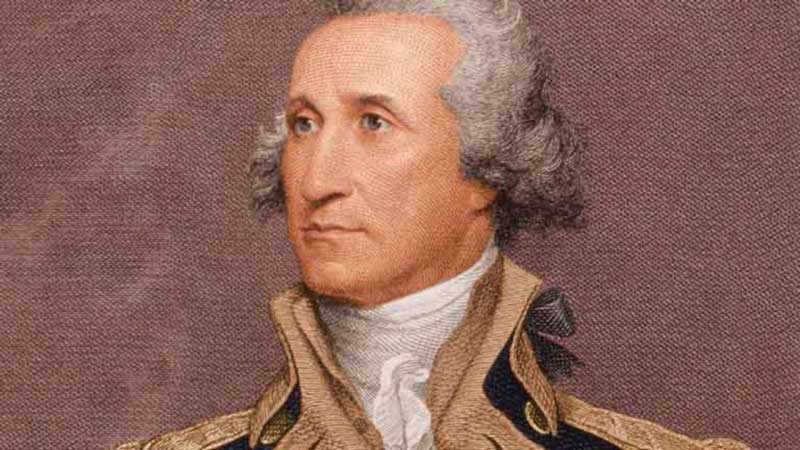
From 1779 to 1781, the Americans suffered a number of setbacks. In the South, the British occupied Georgia by early 1779 and captured Charleston, in South Carolina in May 1780. After the French won a naval victory in the Battle of Chesapeake, Washington moved against Yorktown with a total of around 14,000 soldiers, while a fleet of 36 French warships offshore prevented British reinforcement or evacuation. Trapped and overpowered, Cornwallis found no other way, but to surrender with his entire army on 19 October 1781, which marked the end of major fighting in the Revolutionary War and the removal of the British troops from Charleston and Savannah in late 1782, finally pointed to the end of the conflict. Preliminary articles of peace were signed in Paris by the British and American negotiators on 30 November 1782 and by the Peace of Paris signed on 3 September 1783, Great Britain formally recognized the independence of the United States and that culminated the American War of Independence.
During that time, the American treasury was almost dry. Unpaid soldiers soon became agitated and forced the adjournment of the Congress. A near mutiny was avoided when Washington dispelled unrest by suppressing the Newburgh Conspiracy and convinced Congress to grant a five-year bonus for soldiers in March 1783. After leading the Continental Army for eight and a half years, Washington bade farewell to his officers at Fraunces Tavern in December 1783, resigned his commission days later and returned to Mount Vernon.

He earnestly wished to fulfill his dream of resuming life as a gentleman farmer and to take care and give proper attention to his neglected plantation. Due to the war, the family had to suffer financially. The plantation was neglected and uncared, the yield of the crop was poor due to pestilence and poor weather and the creditors paid him in depreciated wartime currency. He determinately started to work hard to reverse the situation. But, before he could do anything about it, he was called again to the duty of his country in 1787 and was asked to attend the Constitutional Convention in Philadelphia and head the committee to draft the new constitution of the country.
Since independence, the young republic had a structure of government that centered power with the states. But the states were not unified and they fought among themselves over boundaries and navigation rights and refused to contribute to paying off the nation's war debt. Washington was intensely dismayed at the state of affairs and strongly believed that, a national constitution that would unify the nation under a strong central government is urgently needed by the country.
At the Constitutional Convention, Benjamin Franklin nominated Washington for the post of the president and he was unanimously chosen as the president. On the third day of the convention, Randolph introduced the Virginian plan, prepared by James Madison that called for the drafting of an entirely new constitution and a sovereign national government, instead of amending to the Articles. Washington highly recommended the proposal and unsuccessfully lobbied many to support the ratification of the Constitution. In fact, many leading political figures, like Patrick Henry and Sam Adams, condemned the proposed government simply as a grab for power.
When the first presidential election of the United States held on 7 January 1789, Washington suspected that most of the Republicans had not voted for him. But it became apparent that he received a vote from every elector to the Electoral College, the only president in American history to be elected by unanimous approval. On 30 April 1789, George Washington, the first President of the United States of America took the oath of office at the Federal Hall in New York City, the capital of the United States at the time. Initially, he declined the $25,000 salary offered by the Congress for the office of the presidency, as he intended to protect his image as a selfless public servant. However, he was persuaded by the Congress to accept it, to avoid giving the impression that only wealthy men could serve as president.

George Washington was fully aware that his presidency would set a precedent. During his first term, he nominated the first chief justice of the US Supreme Court, signed a bill establishing the first national bank and carefully set up his own presidential cabinet. He established broad-ranging presidential authority, but always consulted with his cabinet, listening to their advice before making a decision. He adopted a series of measures to reduce the nation's debt and established several peace treaties with the Native American tribes and approved a bill establishing the nation's capital in a permanent district along the Potomac River. However, in March 1791, when he signed a bill authorizing the Congress to impose a new excise tax on distilled spirits, the grain farmers in the frontier districts of Pennsylvania strongly protested the move and the consequent escalation of violence and assault against tax collectors gave rise to the Whiskey Rebellion in 1794. As the federal army was not up to the task, Washington invoked the Militia Act to summon state militias. Governors sent troops, Washington took the command and then gave the command to Harry Lee to lead the troop. As150 prisoners were taken into custody, the other rebels dispersed without further fighting. Two of the prisoners were condemned to death, but Washington pardoned them by exercising his Constitutional authority.
At the beginning of the French Revolutionary Wars in April 1792, Washington with the assent of his cabinet, declared America's neutrality. But, on 19 November 1794, Chief Justice John Jay, acting as Washington's negotiator, signed the Jay Treaty to normalize trade relations with Great Britain, removing them from western forts and also to resolve financial debts remaining from the Revolution This action infuriated Secretary of State Thomas Jefferson, who supported France and Washington was subjected to severe and frequent public criticism. However, Washington mobilized public support for the treaty and secured ratification in the Senate. Though controversial, the treaty proved beneficial to the United States, as the British agreed to depart their forts around the Great Lakes, clearly defined boundary between the United States and Canada was established, lots of pre-Revolutionary debts were liquidated, delayed a war with Britain and provided a long period of prosperous trade, which the country needed desperately.
Washington signed the Fugitive Slave Act in 1793, allowing slave owners to cross state lines and retrieve runaway slave and also signed the Slave Trade Act of 1794, which limited American involvement in the Atlantic Slave Trade. He was instrumental in the foundation of the US Navy and commissioned the first six federal frigates.
Washington was re-elected by the Electoral College on 13 February 1793 and in 1796, after the end of the second term, he declined to serve a third term. He returned to Mount Vernon in the spring of 1797 and devoted his full energy to make his beloved plantation as productive as before.

The end came within a short time. On a cold day in the month of December 1799, George Washington spent a long time in inspecting his property on horseback, ignoring an incessant rain. It is said that, as he was hungry, he immediately took his food in his wet attire, as soon as he reached home. He caught acute cold and woke up around 3 am with a severe sore throat. The illness soon turned worse and he died later in the evening of 14 December 1799. The news of his death spread like wildfire throughout the country and the nation plunged into a deep mourning. George Washington, regarded as the father of his country, was entombed at Mount Vernon, which in 1960 was designated a national historic landmark.
